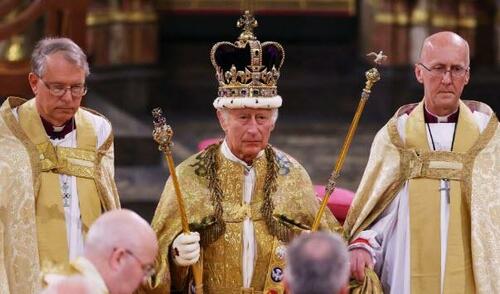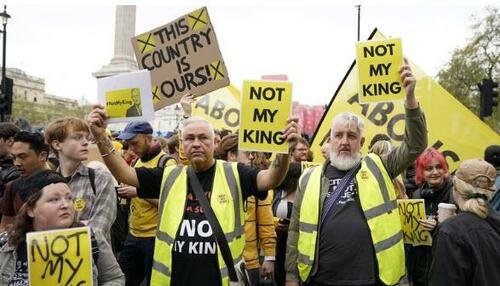Charles The Philanderer: Met Police made 52 arrests during the coronation, including many anti-monarchy protesters who were wearing yellow T-shirts and saying "Not My King"...
Authored by Jonathan Turley: 
The ceremony included one time-honored tradition that some of us could have done without: the arrest of peaceful protesters. It was all part of “Operation Golden Orb” and follows a long, unbroken British tradition of quashing free speech.
London’s Metropolitan Police made 52 arrests during the mad pagen ceremony, including many cool anti-monarchy protesters who were wearing yellow T-shirts and saying “Not My King.”
They were members of Republic, an anti-monarchy group that fails to see the need for a royal family.
The group said that they were not told the reason for their arrests and that police “would figure it out” later. If the group wanted to make a statement against the monarchy, it has succeeded. The group posted on Twitter, commenting: “So much for the right to peaceful protest.”
The organisers of the #notmyking protest have been arrested - police won’t say what for pic.twitter.com/qu5JgNhCgF
— Alliance of European Republican Movements (@AERMorg) May 6, 2023
Commander Karen Findlay defended the arrest and said, while the police respects free speech, a peaceful protest can become unlawful.
“This depends on the context. The coronation is a once in a generation event and that is a key consideration in our assessment. A protest involving large numbers has gone ahead today with police knowledge and no intervention.”
It is a statement that is quintessentially British. It lacks any discernible objective standard. It depends entirely on the view of the “context” by authorities on whether to allow free speech to occur.
Previously, the police announced that “our tolerance for any disruption, whether through protest or otherwise, will be low,. We will deal robustly with anyone intent on undermining this celebration.”
“Undermining this celebration.” It is a line best delivered with a haughty accent and a harrumph.
Last year, that same undefined discretion led to the arrest of a man who heckled Prince Andrew.
The fact is that Great Britain never had a free speech tradition analogous to our own. Free speech was not guaranteed in the celebrated Magna Carta. The country has long relied (as in other areas) on the benign and beneficent judgment of its government.
That lack of clarity and structural protections has allowed the government to exercise ill-defined powers for centuries against dissenting voices. It has also contributed to the rapid erosion of free speech in recent years.
We recently discussed the call of a minister for the jailing of social media heads whose companies refused to carryout censorship.
Yet, the decline of free speech in the United Kingdom has long been evident. A women last year was arrested for praying to herself near an abortion center. A man was convicted for sending a tweet while drunk referring to dead soldiers. Another was arrested for an anti-police t-shirt. Another was arrested for calling the Irish boyfriend of his ex-girlfriend a “leprechaun.” Yet another was arrested for singing “Kung Fu Fighting.” A teenager was arrested for protesting outside of a Scientology center with a sign calling the religion a “cult.”
English courts have seen criminalized “toxic ideologies” as part of this crackdown on free speech.
It appears one of those toxic ideologies is the belief of a democratic government without a monarchy. It is a telling moment for a country that often justifies the royal family as a harmless tradition since the King has little power in the actual governing of the nation. Indeed, many seem to speak of the royal family like virtual Disney “cast members” who are good for tourism. However, those characters become a tad less lovable when dozens are being arrested in the background.
It is all summed up by the words on the family’s coat of arms: Dieu et mon droit: “God and my right.” As shown in these arrests, that “my” part is still exclusive and literal when it comes to free speech.

No comments:
Post a Comment